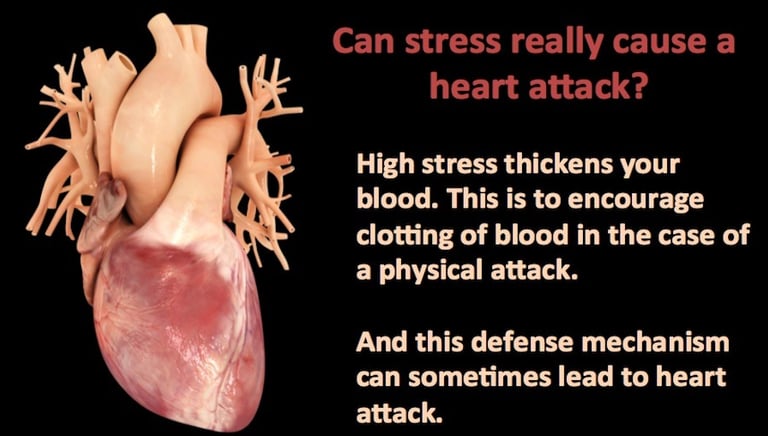Heart Attack: What Are the Risk Factors for Someone with Stress?
Blog post description.
8/30/20252 min read


Heart Attack: What Are the Risk Factors for Someone with Stress?
Stress is an unavoidable part of life. Whether it is work pressure, financial struggles, family responsibilities, or unexpected life events, stress can take a toll on both your mind and body. While occasional stress is normal, chronic stress can significantly increase your risk of heart problems—including a heart attack.
Understanding how stress affects the heart and recognizing the risk factors can help you take steps toward protecting your health.
How Stress Impacts the Heart
When you are stressed, your body releases stress hormones such as cortisol and adrenaline. These hormones trigger the “fight or flight” response, which temporarily increases your heart rate and blood pressure. Over time, if stress remains constant, this repeated strain can damage blood vessels, raise cholesterol, and contribute to heart disease.
Risk Factors for Heart Attack in People with Stress
1. High Blood Pressure
Chronic stress often leads to consistently elevated blood pressure. Over time, this can damage arteries, making it easier for plaque to build up and increasing the risk of a heart attack.
2. Unhealthy Coping Habits
Stress can push people toward harmful habits such as smoking, drinking alcohol, overeating, or consuming excessive caffeine. These coping mechanisms raise the risk of obesity, high cholesterol, and heart disease.
3. Elevated Cholesterol Levels
Stress may increase levels of “bad” LDL cholesterol and triglycerides in the blood, both of which contribute to clogged arteries.
4. Sedentary Lifestyle
Many people under stress reduce physical activity, either due to fatigue, lack of motivation, or time pressure. A sedentary lifestyle is a well-known risk factor for cardiovascular disease.
5. Poor Sleep Quality
Stress often interferes with sleep, leading to insomnia or restless nights. Chronic sleep deprivation raises blood pressure, increases inflammation, and heightens heart attack risk.
6. Diabetes Risk
Stress can raise blood sugar levels, especially in people who are already predisposed to diabetes. Poorly managed diabetes is a strong risk factor for heart attacks.
7. Obesity and Weight Gain
Emotional stress can lead to weight gain, particularly belly fat. This type of fat is linked to a higher risk of cardiovascular problems.
8. Inflammation
Chronic stress triggers inflammation in the body. Inflammation damages arteries, promotes plaque buildup, and increases the chances of heart blockages.
9. Family History and Genetics
For individuals with a family history of heart disease, stress can act as a powerful trigger, accelerating the onset of cardiovascular problems.
10. Depression and Anxiety
Long-term stress often leads to depression or anxiety, both of which are independently linked to a greater likelihood of heart attack and other heart diseases.